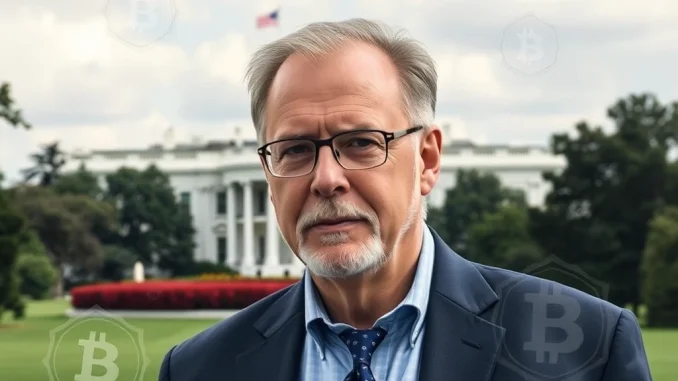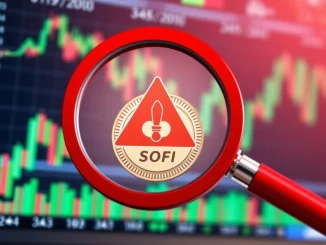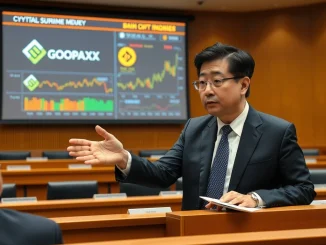
The anticipation surrounding a comprehensive US crypto bill has reached a fever pitch, with a key White House official suggesting legislative clarity is imminent. David Sacks, known for his role advising the White House on artificial intelligence and cryptocurrency matters, recently shared an optimistic outlook on the progress of crucial crypto legislation. In an interview with Bloomberg, Sacks indicated that a bill addressing the complex landscape of digital assets is “very close.” This statement from a figure within the White House inner circle carries significant weight, signaling potential shifts in how the US approaches the rapidly evolving crypto market.
Who is David Sacks and Why Does His Insight Matter?
David Sacks isn’t just any commentator; he holds a specific position as an advisor to the White House, focusing on critical emerging technologies like AI and crypto. His proximity to policy-making discussions provides him with a unique perspective on the administration’s priorities and the legislative agenda. When someone in his position describes a significant piece of legislation as “very close,” it suggests that key hurdles may have been cleared and that the bill is nearing a stage where it could be formally introduced or advanced through Congress. His comments reflect an insider’s view on the trajectory of US policy regarding digital assets.
What Does “Very Close” Mean for Crypto Regulation?
In the world of politics and legislation, “very close” can still involve a few steps, but it typically implies that the foundational work is largely complete. For a crypto bill, this could mean:
- Drafting is largely finalized.
- Key stakeholders within relevant government bodies (like the Treasury, SEC, CFTC) have provided input.
- There is sufficient political will or consensus building to push the bill forward.
- It is positioned on a legislative calendar or ready for a specific procedural step.
The crypto industry has long called for clear regulatory guidelines to foster innovation and provide investor protection. The current landscape in the US is often described as fragmented, with different agencies asserting jurisdiction over various aspects of digital assets. A comprehensive crypto regulation framework could consolidate approaches, define asset classes, and establish clear rules of the road for businesses and consumers alike.
Why is a Unified White House Crypto Stance Crucial?
The lack of a clear, unified stance from the US government has been a point of frustration for many in the crypto space. Businesses face uncertainty, potentially leading them to relocate to jurisdictions with more defined rules. Investors face confusion regarding compliance and the status of various assets. A clear White House crypto policy, potentially codified in a bill, would provide:
| Potential Benefit | Description |
|---|---|
| Clarity for Businesses | Defines how crypto companies should operate, easing compliance burdens. |
| Investor Protection | Establishes safeguards against fraud and manipulation. |
| Innovation | Provides a stable environment for new technologies and applications to develop. |
| Market Confidence | Increases trust in the US digital asset market. |
David Sacks’ comment suggests that the administration is actively working towards providing this much-needed clarity, aligning various governmental perspectives into a cohesive US crypto policy.
What Could This Anticipated US Crypto Policy Address?
While the specifics of the potential bill remain under wraps, based on ongoing discussions in Congress and among regulators, a comprehensive US crypto policy could touch upon several key areas:
- Stablecoins: Establishing a clear framework for issuing and regulating stablecoins, potentially placing them under banking or securities rules.
- Exchanges and Intermediaries: Defining requirements for crypto exchanges, brokers, and custodians regarding registration, capital requirements, and consumer protection.
- Asset Classification: Providing clearer definitions for when a digital asset is considered a security, commodity, or other type of asset.
- Decentralized Finance (DeFi): Grappling with how to apply regulations to decentralized protocols.
- Taxation: Clarifying tax treatment for various crypto activities.
- Illicit Finance: Enhancing measures to prevent the use of crypto for money laundering and other illegal activities.
The challenge lies in crafting legislation that addresses these complex issues effectively without stifling the innovation that is a hallmark of the crypto space. Finding the right balance is key, and Sacks’ optimism might indicate progress on this front.
What Happens Next?
Even if a bill is “very close” to being introduced, the legislative process can still be lengthy. It would need to pass through relevant committees in both the House and the Senate, potentially undergo amendments, and then be voted on by both chambers before heading to the President’s desk to be signed into law. However, Sacks’ statement provides a strong signal that the momentum for federal crypto regulation is building, and stakeholders should prepare for potential legislative action in the near future.
In conclusion, David Sacks’ assertion that a US crypto bill is “very close” is a significant development for the digital asset market. It underscores the growing recognition within the White House of the need for clear, comprehensive crypto regulation. While the details of the forthcoming US crypto policy are eagerly awaited, this statement from a key advisor suggests that the period of regulatory uncertainty may be nearing an end, potentially paving the way for a new era of clarity and growth for the industry.



